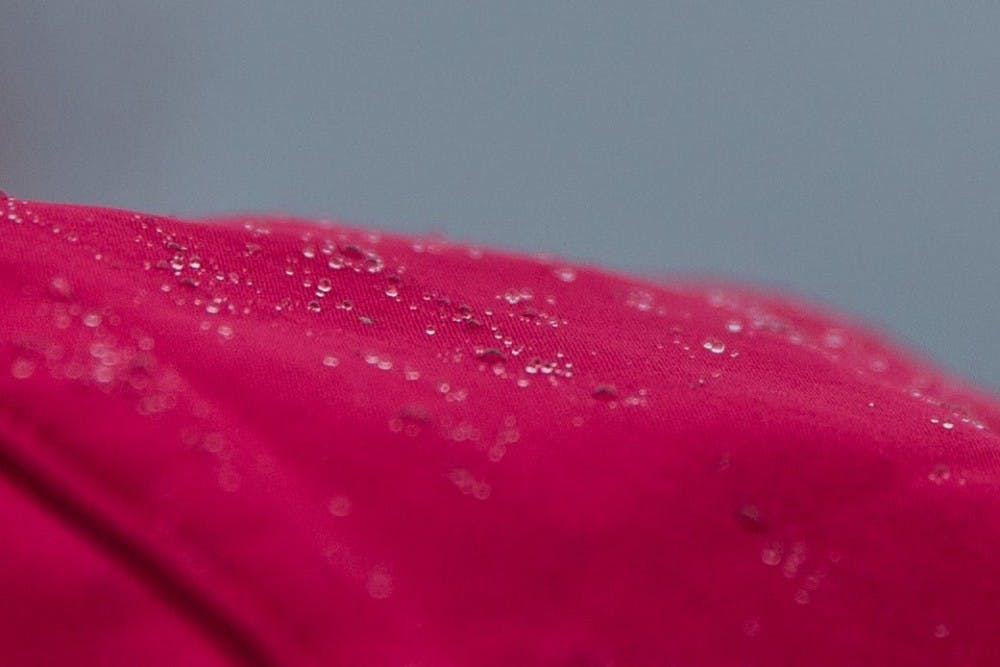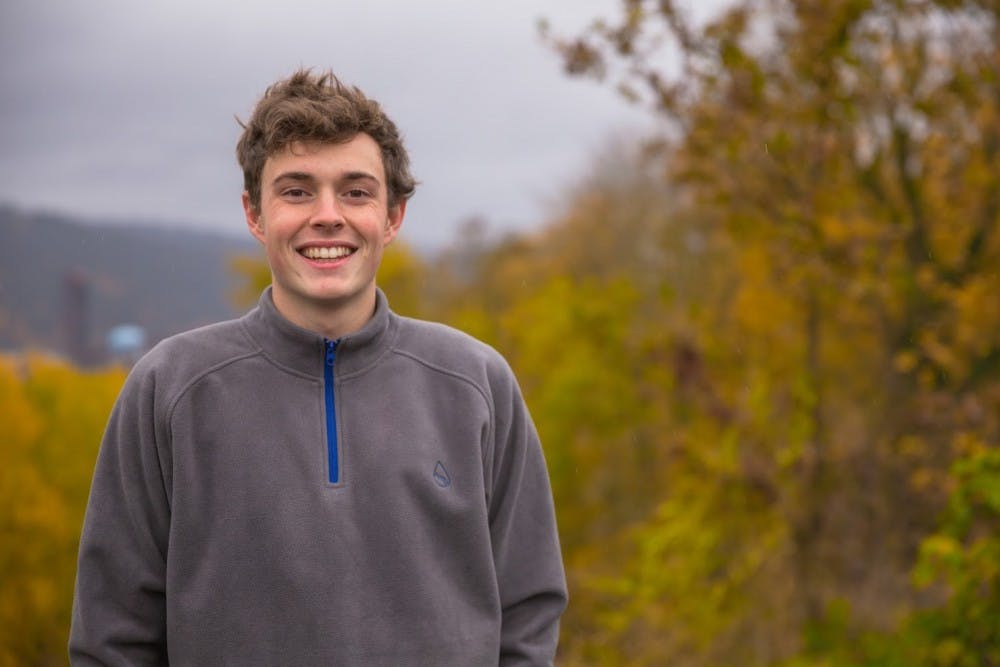On a Saturday in November, senior Michael Williamson hit the slopes at Mt. Hood. While he was out snowboarding with his friends, he wasn’t wearing Burton, Columbia or North Face. He raced down the mountain on his snowboard wearing a jacket he designed himself.
Williamson — an avid snowboarder — realized as a freshman in early 2015 that he wanted a snow jacket that was both lightweight and waterproof. He thought other people might need this too, which inspired him to design his own garment: the Sentri Hoodie.
“It first started because I’m a snowboarder,” Williamson said. “I just wanted a garment that I could use on the mountain that wasn’t the typical huge, heavy, bulky snow jacket because it hurts your performance. You don’t look as good, one, but two, it’s harder to move, and you’re not able to move as freely.”
The hoodie, constructed with a weather-resistant outer shell and lined with fleece on the inside, was well-received, racking up over $50,000 of investment on Kickstarter in early 2016. This initial success inspired Williamson, a senior finance major and entrepreneurship innovation management minor, to start his own outdoor clothing company with the help of UP’s Entrepreneur Scholars program in 2016.
His start-up company, Minim, now has three garments: the hoodie, pants and most recently, the Method Jacket, a waterproof fleece jacket offering greater comfort and flexibility than the hoodie. Between the three products, Williamson has received over $164,000 of investment on Kickstarter and sold between 1,600 and 1,700 units of pants and hoodies. Williamson has traveled to Sweden, Denmark and China for his business, and he plans on continuing to manage his company full-time after he graduates in December.
“Minim is a minimalist outdoor company, so we make multi-use gear to give our users more from less,” Williamson said. “A lot of times Portland is a dynamic landscape. We didn’t think you had to choose between weather-blocking outerwear and the things that we want to wear on a daily basis.”
The design of his first product began in 2015, when he started researching fabrics, designing prototypes, and touring factories in Portland and China, until finally all the seams stitched together to make the Sentri hoodie. All he needed to start his business was funding.
Kickstarter, a website where pledgers can donate to business ventures, was essential to Minim’s business model. Pledgers donated money on Kickstarter to Minim as a way to pre-order Minim’s clothing. Williamson used the funds made from Kickstarter to manufacture the garments, which are then shipped to their designated patrons. Using Kickstarter, Minim has been self-funded, except for a few loans. All three Kickstarters have been successful, as each has surpassed their goals of $10,000 by thousands of dollars.
Williamson launched the first Kickstarter for the Sentri hoodie in February 2016. Months later, Williamson updated the hoodie, resolved quirks with the original design and renamed it the Tech hoodie. He also rebranded the company, changing the name from Sentri Performance to Minim to reflect the minimalist perspective of the brand.

The water beads off the waterproof jacket that Michael Williamson has created for his new company, Minim.
Through his success, Williamson wants to set an example for other students who also dream of one day starting their own businesses.
“I always wanted to start a company,” Williamson said. “I wanted to do something in the spaces that I cared about, (and) a lot of my life revolved around snowboarding specifically. I saw the opportunity within the space.”
Williamson balances running Minim with school, but he has help from friends. UP alum Reid Paquet worked with Williamson since the company’s beginnings and continues to work operational and financial roles part-time. Jeremy Revlock, a junior marketing major and a friend of Williamson’s, helped out by demonstrating apparel in Minim promotional videos.
“I think there are traits that make somebody innovative, and I think (Williamson) has a lot of those,” Revlock said. “He’s somebody who likes to see things through to the end, somebody who is dedicated but also passionate through many mediums of work. You can see it in his snowboarding, you can see it in his skating. He’s somebody that’s really focused on what he wants to get.”
Williamson attends UP part-time — taking three classes per semester — to focus on Minim. He said business classes at UP have helped him figure out how to start his own business.
Classes relating to finance and accounting, where he learned cost allocation, have been crucial to the success of his company. Williamson said his core requirement classes have also been helpful as he’s developed his business.
In addition to business classes, Williamson believes the humanities are just as important. “I think theology and philosophy classes are really underrated,” Williamson said. “Just because it forces you to communicate effectively and think it terms that aren’t concrete right in front of you.”
Williamson also found inspiration for his company while participating in Entrepreneur Scholars, also called E-Scholars, during the 2015-2016 school year. In this program, Williamson took classes related to innovation and entrepreneurship and made prototypes for products he would eventually develop for Minim. The program also offered opportunities to travel and network with professionals.

Michael Williamson is sporting his Minim hat and red waterproof jacket.
In the fall of 2016, Williamson was nominated for the University Startup World Cup by Peter Rachor, UP’s Director for Entrepreneurship and Innovation. Williamson spent a week presenting a prototype of a self-heating jacket in Copenhagen, Denmark, under the Sentri Performance brand. He won runner-up in the category Industry Tech & Robotics.
“Denmark was an amazing experience,” Williamson said. “I met an incredible amount of people from around the world working on ground-breaking ventures. Having like-minded students from all continents gather for a week of learning and showcasing amazing projects was an experience unlike anything else I've ever had.”
Williamson also traveled to Stockholm, Sweden with E-Scholars for networking and innovation events. He was in Stockholm over spring break of 2016 presenting his Sentri Hoodie, when he received some messages on Instagram by locals looking to purchase the product.
“He agreed to meet up with them,” Rachor said. “Took like three trains and two buses to get to the slopes. He met up with them — they’re still friends — and they tried out his hoodie, gave feedback, and referred him to some snowboarding shops. I think one of them still carries the product.”
Starting a business is no small feat, especially for a college student. For Williamson, accomplishing his goals came from being brave enough to take the first step.
“Be in tune with problems in your life and other people’s lives,” Williamson said. “Look into it, start to work on it, and see what happens.”









